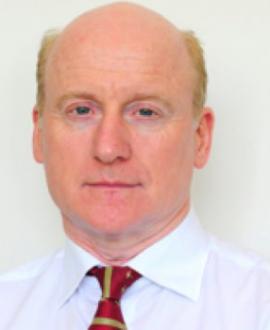At Hermitage Clinic, our expert team works across 2 areas of cardiology:
- Cardiac diagnostics, where we assess your heart health
- Cardiac Catheterisation Lab (Cath Lab), where our specialists conduct invasive cardiology procedures
Our team also works in tandem with our sister hospital, Blackrock Clinic, who specialise in cardiothoracic surgical care.
Cardiac diagnostics
We carry out a wide range of non-invasive tests to diagnose heart complaints.
We offer same-day appointments and aim to see everyone within 2-3 weeks. We can also perform same-day tests if you're referred as an urgent case.
Our highly skilled, patient-focused team will look after you through your diagnosis, treatment and recovery.
On the day of your test, our team will meet you at the cardiology department on the ground floor. Please arrive 15 minutes ahead of your appointment time so that we can register you.
Tests
An Electrocardiogram (ECG) records electrical signals in your heart and can diagnose heart rhythm disorders.
The test involves lying down with electrodes on your chest, wrists and ankles. Electrodes are connected to an ECG machine which records your heartbeat.
Length of test: about 10 minutes
Prepare for your test: On the day, do not apply lotions or oils to your skin as they can interfere with our recording.
An echocardiogram (Echo) is an ultrasound that takes images of your heart, valves and major blood vessels. It will show how they are working and can diagnose structural problems with your heart.
The test involves lying down while we take images of your chest.
Your cardiologist may recommend you have a particular type of Echo. Your test may include a:
- Bubble study, which involves a solution being injected into an arm vein.
- Transoesophageal echocardiogram (TOE), which involves a probe going down your throat to get a clearer view of the heart
Length of test: about 30-45 minutes
During an Exercise Stress Test (EST) you will walk on a treadmill at different speeds while connected to an ECG monitor. You may be referred for an EST if you have chest pain, suspected coronary artery disease or palpitations.
Length of test: 45 minutes
Prepare for your test: On the day, do not apply lotions or oils to your skin as they can interfere with our recording. Wear loose, comfortable clothing and shoes. Eat something at least 1 hour before your test.
A holter monitor is a continuous recording of your ECG. It can diagnose many heart rhythm disorders, including palpitations.
We'll place 3 stickers on your chest which are connected to a monitor. You can go about your day as normal while wearing your monitor, except for bathing and showering. Your monitor cannot get wet.
Length of fitting: about 15 minutes
Prepare for your fitting: On the day of your fitting, do not apply lotions or oils to your skin as they can interfere with our recording.
A blood pressure (BP) monitor records your BP for 24 hours. It can diagnose patients with hypertension or high blood pressure.
You'll wear the monitor on a belt around your waist, which is then attached to a cuff on your arm. The cuff will inflate and deflate every 20 minutes during the day and every 60 minutes at night.
You can go about your day as normal while wearing your monitor, except for bathing and showering. Your monitor cannot get wet.
Length of fitting: about 15 minutes
Prepare for your fitting: Wear a loose-fitting top to allow the cuff to sit on your arm.
An event monitor is a small heart rate monitor that you wear for 1 week. We use event monitors to log infrequent cardiac symptoms.
We'll place 3 stickers on your chest which are connected to a monitor. This monitor is then clipped to your waistband.
While wearing your monitor, you'll need to press a button when you get symptoms and then make a note of what you're doing at the time.
You can go about your day as normal and remove the monitor for bathing.
Length of fitting: about 20 minutes
Prepare for your fitting: On the week of your test, do not apply lotions or oils to your skin as they can interfere with our recording.
If you have a pacemaker, defibrillator or loop recorder, you may need to attend regular check-ups to make sure it's working properly and that there's enough battery life.
If you experience any cardiac symptoms while fitted with your device, contact us to arrange an appointment.
Cath Lab procedures
Our consultant cardiologists can help prevent and treat heart conditions through a range of procedures in our advanced Cath Lab. Procedures include:
- angiograms (tests that use dye and x-rays to check the arteries around your heart)
- angioplasty (procedure to unblock arteries)
- pacemaker, defibrillator and loop recorder fittings
- electrophysiology studies, including ablation to restore a regular heartbeat
- emergency procedures
As a patient of our Cath Lab, you'll be cared for by our specialist team of:
- Consultant cardiologists
- Cardiac physiologists
- Nurses
- Radiographers
If you come to us for a procedure, we'll observe you in our 6-bed day unit. We'll monitor you closely and offer some light refreshments.
Some interventional cases require an overnight stay. Our team will make sure you're aware if this is the case.
Insurance
Not all services are covered by health insurance. To find out if you're covered, contact your health insurance provider before your visit.
Visit our Health insurance and self-pay page for more information.
Payment
If you do not have health insurance or your health plan does not cover the full cost, you will need to pay on the day of your visit.
You might be able to claim fees on your insurance.
If you need to submit an insurance excess or pay inpatient fees after a stay at the Hermitage Clinic, you can pay your bill online.
















